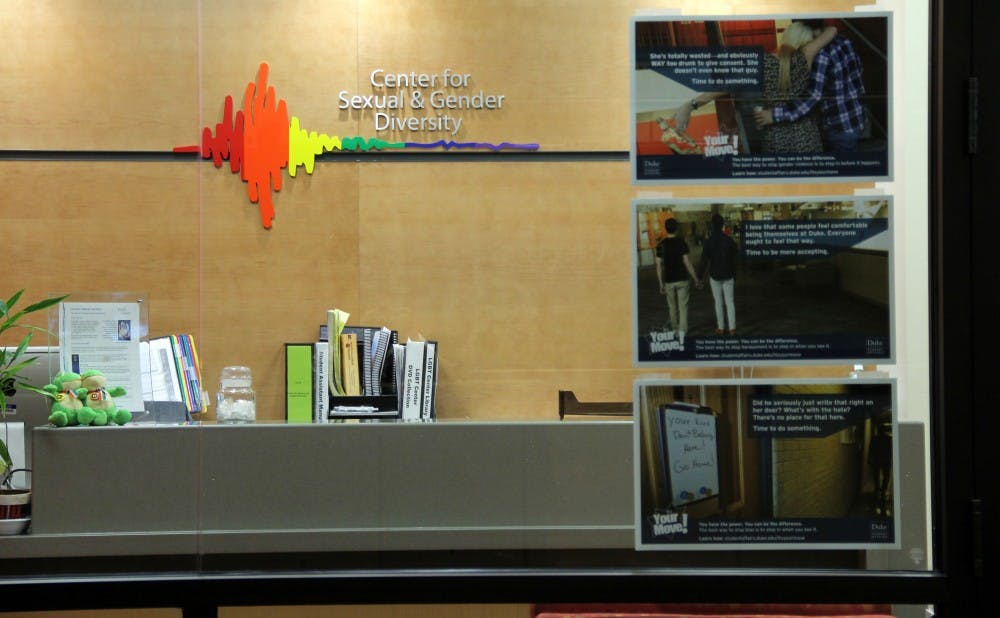First-year students have the opportunity to learn from LGBTQ+ identifying upperclassmen through a new peer mentoring program.
The Peer-to-Peer Mentoring Program, co-launched last year by the Center for Sexual and Gender Diversity (CSGD) and Blue Devils United (BDU), pairs LGBTQ+ identifying first-year students and upperclassmen together to ease the transition into college life.
The LGBTQ+ mentoring program is meant to help first-years overcome the challenge of identifying with a socially marginalized group. The program can provide academic resources but also aims to help LGBTQ+ first-year students navigate identity-related struggles.
Mentees and mentors sign up for the program through the Student Affairs website. Prospective mentors are trained and are paired with a first-year mentee. Incoming students joining the program in the fall semester are expected to participate for at least a year, while those joining in the spring are expected to be active for a semester.
To match mentor-mentee pairs, program administrators use a sign-up system that includes questions such as “Would you like your mentor to share similar identities or similar interests?” according to senior Grace O’Connor, the 2020-21 BDU president.
The CSGD and BDU initially conceived of the idea for a peer mentoring program independently and decided to work together on this effort, O’Connor said, adding that “working together on this project has brought the two organizations even closer together.”
Ellen Mines, Trinity ‘21 and a former CSGD staff member, is from Kansas, which she described as “not super accepting or liberal.” Duke’s campus culture of inclusivity and openness allowed her to start exploring her identity, she said.
“That was cool, but it was also kind of scary because I hadn’t done anything like that before. So the goal of this program is to give first-years someone to talk to who has been through that same experience,” Mines said.
For O’Connor, getting to know older queer people and seeing how they navigated Duke was very important when she was a first-year.
“Being queer at Duke, navigating that along with other intersectional identities can be overwhelming, especially in the South. It’s hard enough without having any marginalized identities,” she said.
Mentorship programs offer a unique resource for first-years.
“You have a person who essentially functions as a friend who has already gone through the same experiences you have and is there to listen to you,” Mines said.
She pointed out that this program is entirely student-run, which can be less intimidating than other campus resources. “Students sometimes just want to talk to a peer; they don’t necessarily want to confide in somebody who they see as having some sort of power differential.”
Though the CSGD has an established alumni mentoring program, which connects queer alumni to students, the peer mentoring program helps new students “understand what kind of communities exist right now on campus” by connecting with current undergraduates “who were first-years not too long ago themselves and understand what the experience was like,” Mines said.
The program’s inaugural year had 15 pairs and around 30 upperclassmen mentors.
A goal for the future is to help spread awareness of the program, Mines noted. To achieve this, the CSGD is planning to include information about this program in future Orientation Week materials including First-Year Advisory Counselor and resident assistant training.
The pandemic has been one of the biggest setbacks to starting the program, with Duke’s COVID-19 guidelines significantly limiting in-person interaction on campus.
“Due to Zoom fatigue and just the craziness of life during COVID, we weren’t able to have large group get-togethers or discussions,” O’Connor added.
Next year, program administrators hope to improve upon participants’ experience by having a physical space for activities and gatherings.
“The CSGD is so important, having that physical space of total acceptance, because it can feel weird or uncomfortable to have identity-related discussions in certain spaces,” O’Connor said.
“It’s been difficult for first-years to find a community this year. At the same time, I feel like this program has hopefully been helpful in overcoming that,” Mines said.
Get The Chronicle straight to your inbox
Signup for our weekly newsletter. Cancel at any time.
Anisha Reddy is a Trinity junior and a senior editor of The Chronicle's 118th volume.

